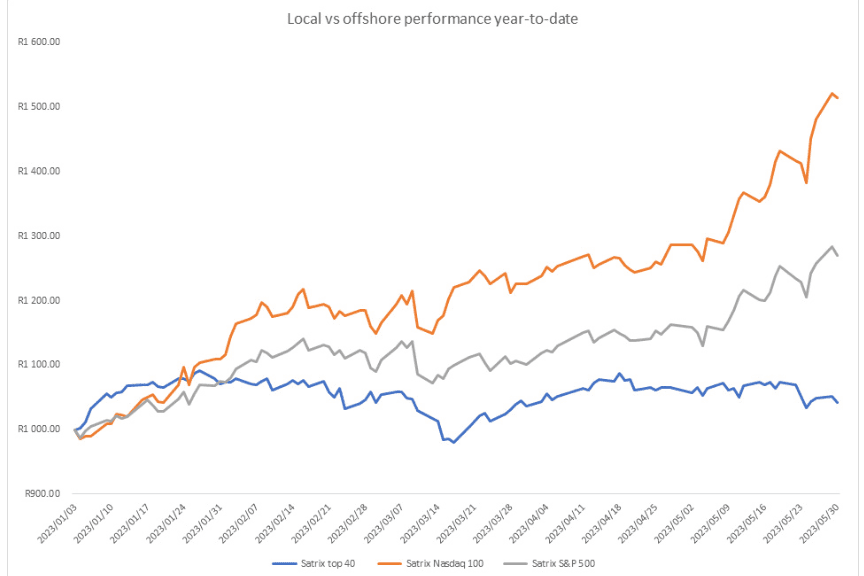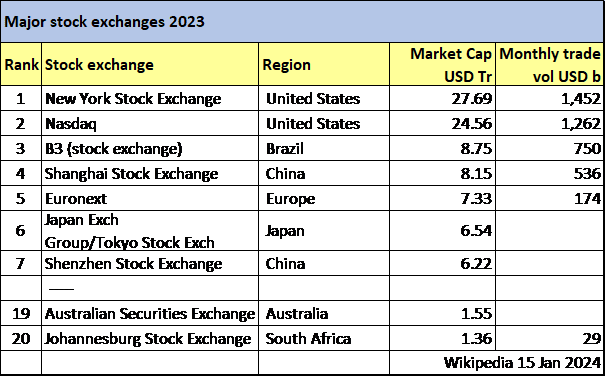The role of financial markets in the South African economy
The gradual relaxation of exchange controls in South Africa since the advent of democracy has allowed South African investors to invest in a much wider range of asset classes and equities on the global market, resulting in diversification, risk reduction and hedging opportunities. Before 1994, South African individuals and businesses were heavily restricted to invest on foreign stock exchanges and markets.
What are financial markets?
In the broad sense, financial markets encompass transactions where the underlying item is money.
Money has facilitated exchanges and investments, enabling the creation of financial markets as we know them today to the extent that financial markets have become indispensable in economies.
Most savings of individuals and businesses, especially long-term savings, are invested in the stock market via retirement and pension savings, and investments in unit trusts and ETFs (exchange traded funds). Those savings are redirected from life insurance companies provident fund schemes and various intermediaries into shares listed on the stock exchange, and marginally, in unlisted shares traded over the counter. Companies can raise capital on the stock exchange. All these activities in financial markets accrue to individual savings, which are the foundation of economic growth and wealth creation.
The JSE and its comparative performance
The main institution representing financial markets is the stock exchange. The Johannesburg Stock Exchange (JSE) is not the only exchange South Africans can invest in, and as the graph shows, other major markets, as illustrated here with the US, have done much better.

A comparison between the JSE and other financial markets in the table below indicates that there is opportunity for investors to diversify in currency and the range of options at their disposal. To reinforce the importance and benefits of diversification for South Africans, the table also shows the performance of the JSE in comparison to other exchanges.
The JSE has suffered from the underlying performance of the South African economy and performed much worse than its US competitors.
Institutional vs individual and retail investors
South African financial markets are heavily focused on large institutional investors and not individuals, and the value of retail investors is still underestimated.

- According to tructuredRetailProducts.com (Risk.net): “Structured (investment) products in Belgium are a big deal. Although the country is around a sixth of the size of the United Kingdom and has only 10 million residents, the land of fine beer and chocolate punches above its weight with sales higher than the UK market’s estimated €8bn” … referring to sales to the “Belgian dentist”, who typifies the well-to-do private investor.
- Shanks Group, a waste management company, said it had raised €100m (£63m) through the issue of a bond sold exclusively to private investors in Belgium, according to The Times UK, and it became the first British company to tap into the “Belgian dentist”.
For South Africa to tap into this retail investor segment, there needs to be better access to information and competitive fee structures. The discrepancy between freely available stock exchange and investment product information provided by the JSE and competing (international) financial markets, is concerning. Today, instant online information is what investors want and get from overseas markets.
Warren Buffett is often quoted saying that retail investors should focus on the cost of their investments as a major input to their investment decision-making. Yet, only recently have some financial intermediaries begun to offer free trading accounts, and still only for a limited number of equities.
Conclusion
The gradual easing of exchange controls in South Africa has expanded investment opportunities, fostering diversification and risk management. Financial markets play a pivotal role in driving economic growth and wealth creation. However, there is a need for South Africa to tap into the potential of retail investors by improving access to information and introducing competitive fee structures for individual investors. This calls for innovative strategies in the financial services sector to better serve retail investors and diversify from a focus on institutional investors.
For a deep dive into this industry, purchase the full report on the administration of financial markets.
Contact us to access WOW's quality research on African industries and business
Contact UsRelated Articles
BlogCountries Financial and insurance activitiesSouth Africa
Cryptocurrencies and security dealing activities in South Africa
Contents [hide] The main players in securities dealings and South Africa’s position The rise of cryptocurrencies has introduced new dynamics in securities dealing, challenging traditional financial markets and regulatory frameworks....
BlogCountries Financial and insurance activitiesSouth Africa
The development of flexible and customised insurance products in South Africa
Contents [hide] Life insurance as a business Life insurance is unlike many other businesses in that it has an uncertain future cost associated with the income it generates from premiums,...
BlogCountries Financial and insurance activitiesSouth Africa
The rise of new competition in the South African banking sector
Contents [hide] The financial services sector in South Africa stretches from the South African Reserve Bank to micro lenders, cooperative banks, stokvels and loyalty programmes that have become popular for...





